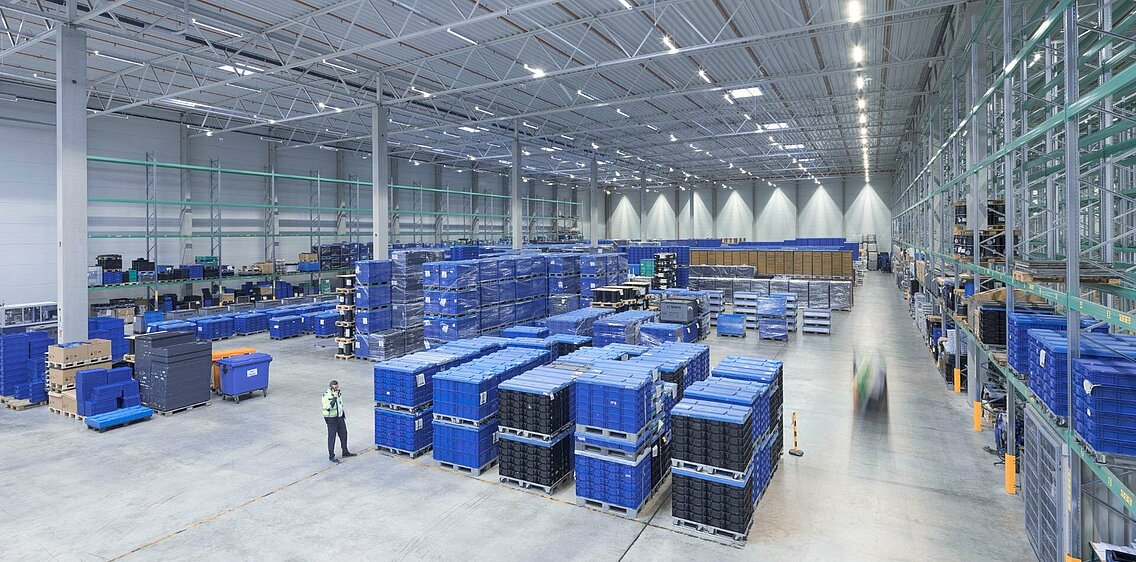
Cost factor spare parts
“Spare parts are a cost driver for many companies. In addition to procurement costs, there are also costs for logistics and storage, personnel, tied-up capital and, in some cases, the scrapping of unused parts. With our pooling model, we enable our customers to significantly reduce the total cost of ownership for spare parts in the production area. They only pay a fee for the availability provided and on an as-needed basis for the spare parts actually required. The model thus increases the flexibility of production as well as the predictability of our customers’ production costs,” explains Nino Braun, Product Management Europe at Leadec.
Basically, a pooling model is possible for all companies that have several warehouses or sites. Even within a single company, the rate of common parts is often 15 to 25 percent. However, it becomes even more efficient when Leadec supplies several companies from one warehouse.
Know what is there
To optimize inventory management, you first need an overview of which parts are all in stock in the first place. And that is easier said than done. Often, up to two-thirds of all data records in the ERP system are incorrect due to inconsistent spellings, hidden duplicates or recoded data records.
Here, the solution from our partner Sparetech ensures transparency. In the first step, spare parts are uniquely identified using state-of-the-art technologies from the fields of semantic data management, big data and automated data processing. In the second step, duplicates, discontinuations and common parts across locations are made visible and original manufacturer product information is added. This creates a complete and error-free database.
Nino Braun, Product Management Europe at Leadec
Spare parts are a cost driver for many companies. In addition to procurement costs, there are also costs for logistics and storage, personnel, tied-up capital and, in some cases, the scrapping of unused parts.
Warehouse management across sites
This database is the basic prerequisite for setting up a warehouse management system across sites in which several plants access a central spare parts warehouse. This integrated approach reduces inventories and saves costs, while at the same time increasing availability. Here, Leadec contributes its expertise in in-plant logistics and maintenance from its daily work in more than 300 factories worldwide. Another advantage: the transparent data situation enables data-based production equipment maintenance (PEM). This reduces downtimes in production and increases quality.
Spare parts on demand
“Spare parts procurement can become even more flexible when several companies access a spare parts pool. Spare parts are delivered on demand and financing models, so-called off-balancing, can significantly reduce tied-up capital,” says Stephan Hihn, Head of Product Management Europe at Leadec.
Leadec is currently demonstrating what this can look like in practice in a pilot project. In the first step, warehousing was optimized for a globally active automotive supplier in southwestern Germany, the common parts ratio was calculated, and preparations were made to outsource spare parts from a total of five sites and deliver them as needed.
More companies wanted
From 2023, in a second step, five companies are to share a common warehouse – which will significantly reduce storage costs for each of them. Leadec expects the share of shared parts to be 30–50%. We are looking for companies that have the following initial situation:
- Decentralized production network with sites in Europe
- Production plants and production lines with high availability requirements
- Interest in off-balancing and physically outsourcing their production spare parts
- The physical spare parts warehouse is to be digitized and inventories optimized
The focus is on high-priced, low-turnover spare parts within complex and highly automated production lines and technical peripherals. The corresponding spare parts are required in particular as replacements during repair measures on highly critical machines with a risk of failure to ensure production availability.
If you are interested, please contact Nino Braun at Leadec in Stuttgart. Email: nino.braun(at)leadec-services.com, phone: 0711 7841 450.

You might also be interested in:
Whitepaper - Integrated spare parts management
Article in Leadec Pulse - The Spare Parts Devil is in the Details

















